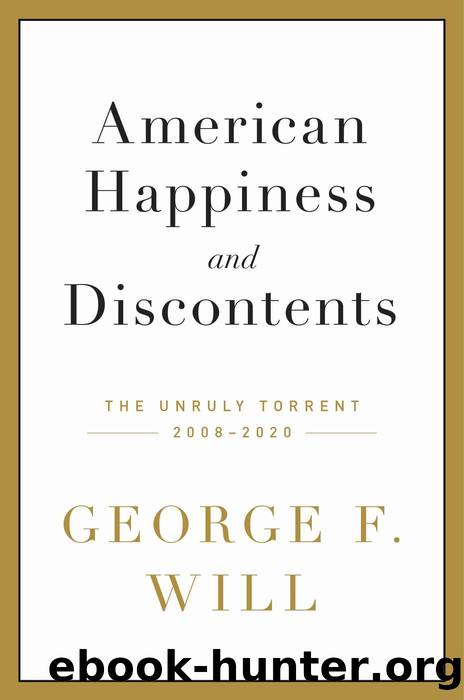American Happiness and Discontents by George F. Will

Author:George F. Will
Language: eng
Format: epub
Publisher: Hachette Books
Published: 2021-09-14T00:00:00+00:00
âWhere Is the Pencil Czar?â
September 14, 2008
WASHINGTONâImprobable as it might seem, perhaps the most important fact for a voter or politician to know is: No one can make a pencil. That truth is the essence of a novella that is, remarkably, both didactic and romantic. Even more remarkable, its author is an economist. If you read Russell Robertsâs The Price of Everything: A Parable of Possibility and Prosperity you will see the world afreshâunless you already understand Friedrich Hayekâs idea of spontaneous order.
Roberts, an economist at George Mason University and Stanfordâs Hoover Institution, sets his story in the Bay Area, where some Stanford students are indignant because a Big Box store doubled its prices after an earthquake. A student leader plans to protest Stanfordâs acceptance of a large gift from Big Box. The studentâs economics professor, Ruth, rather than attempting to dissuade him, begins leading him and his classmates to an understanding of prices, markets, and the marvel of social cooperation. Holding up a Dixon Ticonderoga No. 2, she says: âNo one can make a pencil.â
Nonsense, her students thinkâsomeone made that one. Not really, says Ruth. Loggers felled the cedar trees, truckers hauled them, manufacturers built the machines that cut the wood into five-sided portions to hold graphite mined in Sri Lanka, Mexico, China, and Brazil. Miners and smelters produced the aluminum that holds the rubber eraser, produced far away, as were the machines that stamp TICONDEROGA in green paint, made somewhere else, on the finished pencil.
Producing this simple, mundane device is, Ruth says, âan achievement on the order of a jazz quartet improvising a tune when the band members are in separate cities.â An unimpressed student says, âSo a lot of people work on a pencil. Whatâs the big deal?â Ruth responds: Who commands the millions of people involved in making a pencil? Who is in charge? Where is the pencil czar?
Her point is that markets allow order to emerge without anyone imposing it. The âpoetry of the possibleâ is that things are organized without an organizer. âThe graphite miner in Sri Lanka doesnât realize heâs cooperating with the cedar farmer in California to serve the pencil customer in Maine.â The boss of the pencil factory does not boss very much: He does not decide the prices of the elements of his productâor of his product. No one decides. Everyone buying and selling things does so as prices steer resources hither and yon, harmonizing supplies and demands.
Goods and services, like languages, result from innumerable human actionsâbut not from any human design. âWe,â says Ruth, âcreate them with our actions, but not intentionally. They are tapestries we weave unknowingly.â They are âemergent phenomena,â the results of human action but not of human design.
When a student asks about the exploitation of housecleaners, Ruth responds that if they are exploited making between ten dollarsâabove the minimum wageâand twenty dollars an hour, why are they not exploited even more? The answer is that the market makes people pay maids more than the law requires because maids have alternatives.
Download
This site does not store any files on its server. We only index and link to content provided by other sites. Please contact the content providers to delete copyright contents if any and email us, we'll remove relevant links or contents immediately.
| Anthropology | Archaeology |
| Philosophy | Politics & Government |
| Social Sciences | Sociology |
| Women's Studies |
The Secret History by Donna Tartt(16622)
The Social Justice Warrior Handbook by Lisa De Pasquale(11489)
Thirteen Reasons Why by Jay Asher(7788)
This Is How You Lose Her by Junot Diaz(5770)
Weapons of Math Destruction by Cathy O'Neil(5036)
Zero to One by Peter Thiel(4824)
The Myth of the Strong Leader by Archie Brown(4789)
Promise Me, Dad by Joe Biden(4447)
Beartown by Fredrik Backman(4415)
Stone's Rules by Roger Stone(4415)
How Democracies Die by Steven Levitsky & Daniel Ziblatt(4398)
The Fire Next Time by James Baldwin(4342)
100 Deadly Skills by Clint Emerson(4076)
A Higher Loyalty: Truth, Lies, and Leadership by James Comey(4032)
Rise and Kill First by Ronen Bergman(4012)
The David Icke Guide to the Global Conspiracy (and how to end it) by David Icke(3881)
The Farm by Tom Rob Smith(3872)
Secrecy World by Jake Bernstein(3782)
The Doomsday Machine by Daniel Ellsberg(3730)
